#free me of this etymological prison
Explore tagged Tumblr posts
Text
what if instead of miles edgeworth they named him miles goonworth
#phoenix wright#wrightworth#narumitsu#im so sorry#its 4am#i am very eepy#and my girlfriend just bought#ace attorney#and im trying to wright#but i can only wrong#free me of this etymological prison
9 notes
·
View notes
Text
About Astarion, Cazador, and what it means to be bad.
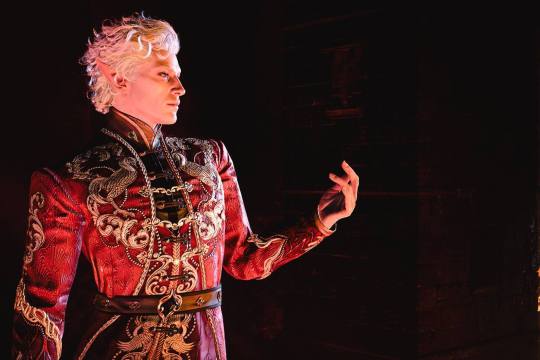
In Italian the word "bad" is translated as "cattivo", whose etymology derives from the Latin captivus, prisoner. I think our ancestors had profound wisdom when it came to understanding human nature, generally speaking, most people who are considered "bad" often act like that and hurt others because they are prisoners of their own hurt and fears. This does not mean that they are justified in their actions, of course, at the end of the day we are all responsible for our behaviors, and trying to understand why someone may act a certain way does not equal to justify them.
Astarion's story revolves around overcoming trauma and hurt to not repeat the cycle of abuse.
On one hand, there's Ascendant Astarion, who loses himself and his humanity, in favor of his hunger for power. A hunger that is fueled by fear, and the conviction that he can only count on himself and only the ones who have power are safe and free to do whatever they want.
"One last thrust and I'll be free of you. I'll never have to fear you again. But if I finish the ritual you started, I'll never have to fear anyone, ever."
In reality, he becomes shackled to his fears, never truly free to move on, to face his trauma and overcome it. He will forever be watching his back, paranoid and worried about being betrayed. He becomes what he has always feared and hated, he is now the monster that haunted his nightmares, and the cycle repeats.
Before Astarion, there was Cazador, who succumbed to his own hurt and trauma and ended up perpetuating the abuse. He too was tortured by his master, Vellioth, and punished by being impaled for 11 years when he rebelled, not even for the rebellion itself but because he failed. Cazador too was just a victim in the beginning, but eventually turned into a monster himself.
“The boy I was, the man I became, the monster that will not end. I sleep, but cannot rest, I live, but cannot die. I am eternal, and I grieve.”
It's even more telling when you realize that Cazador probably saw himself in Astarion, every time he looked at him he was reminded of his old self, whom he perceived as pitiful, powerless, and detestable, all his unresolved traumas were thus projected onto Astarion, who was made a scapegoat and punished. (NB This is not to pity or humanize Cazador, by the time you get to confront him, he is a full-blown-out psychopath, and he needs to go down).
On the other hand, we have Astarion as a spawn, who was able to reject the ritual. He recognized that the power on offer wasn't going to set him free.
"I know you think this will set you free, but it won't. This power will trap you, just like it trapped Cazador."
He retains his soul, his humanity, and by facing his fears he is able to let go. He is now able to see that true strength does not come from a dark and twisted power like the one the ritual offers, it does not come from dominating others and from hurting them before they hurt you in an endless cycle of pain and vengeance, but it comes from within. It's the strength to be kind, to be forgiving toward ourselves and others, the strength to hope and be open and vulnerable, to let others in and take the chance to see if there are others out there with a big heart like Tav's. To live again is to care again. He realizes that he is enough, just the way he is, and he can finally start the healing process. The cycle is broken, and he is finally free.
"But you saw something else in me - someone else I could be. Someone who could break the cycle of power and terror that started centuries ago."
"You saved me from myself and let me walk a path where I can be free. Truly, honestly free. This is a gift, you know. Thank you - I won't forget it."
(I know most of these things were already discussed, but I had to share my thoughts. I love it when even the etymology of words that we usually use without thinking too much makes sense and everything comes full circle.)
Thanks to @myopic-skull for letting me borrow his super cool photo of Astarion being a glorious regal cat
#bg3#bg3 spoilers#baldur's gate 3#baldur’s gate 3#baldur's gate iii#astarion#astarion ancunin#character analysis#my analysis
95 notes
·
View notes
Text



SHIP // YUANHAAR ; general of the xianzhou x wingweaver healer. jing yuan && bahaar // ship tag ⊹ character tag ⊹ general ship tag.

❝ o, but look here now, this is just absurd, he way our famous poets talk of girls as weak and winsome, weak? is this a word to use of those who, with the shake of curls and with the triumph of a modest glance, can lead the very gods a merry dance? ❞ — BATRHARI.

writings + rots. etymology
moodboards. general moodboard
doodles. intimacy ( in touch )

tropes. enemies ( ??? ) to lovers ⊹ slowburn ⊹ mutual pining ⊹ saving each other's life ⊹ stuck in a prison cell together ( hahahaha ) ⊹ mutual pining ⊹ she fell first, he fell harder ⊹ hurt / comfort ⊹ forbidden romances ??? ⊹ redemption and second chances ⊹ two old, hurt people vibing ⊹ warrior x healer ⊹ warrior x healer but the healer WILL throw hands ⊹ stranger in a strange land ⊹ healing ⊹ can take tragic turns ⊹ size difference.
playlist. set me free ( floruit show ) ⊹ darling ( usha uthup ) ⊹ shrike ( hozier ) ⊹ technicolor beat ( the oh hellos ) ⊹ masakali ( mohit chauhan ).

6 notes
·
View notes
Text
Don’t be indifferent to the horrors in Palestine.
I thank my English class for showing me this speech, I just wish that the events in Gaza were discussed as a part of it. Don’t be indifferent, say something.
“Mr. President, Mrs. Clinton, members of Congress, Ambassador Holbrooke, Excellencies, friends:
Fifty-four years ago to the day, a young Jewish boy from a small town in the Carpathian Mountains woke up, not far from Goethe's beloved Weimar, in a place of eternal infamy called Buchenwald. He was finally free, but there was no joy in his heart. He thought there never would be again. Liberated a day earlier by American soldiers, he remembers their rage at what they saw. And even if he lives to be a very old man, he will always be grateful to them for that rage, and also for their compassion. Though he did not understand their language, their eyes told him what he needed to know -- that they, too, would remember, and bear witness.
And now, I stand before you, Mr. President -- Commander-in-Chief of the army that freed me, and tens of thousands of others -- and I am filled with a profound and abiding gratitude to the American people. "Gratitude" is a word that I cherish. Gratitude is what defines the humanity of the human being. And I am grateful to you, Hillary, or Mrs. Clinton, for what you said, and for what you are doing for children in the world, for the homeless, for the victims of injustice, the victims of destiny and society. And I thank all of you for being here.
We are on the threshold of a new century, a new millennium. What will the legacy of this vanishing century be? How will it be remembered in the new millennium? Surely it will be judged, and judged severely, in both moral and metaphysical terms. These failures have cast a dark shadow over humanity: two World Wars, countless civil wars, the senseless chain of assassinations (Gandhi, the Kennedys, Martin Luther King, Sadat, Rabin), bloodbaths in Cambodia and Algeria, India and Pakistan, Ireland and Rwanda, Eritrea and Ethiopia, Sarajevo and Kosovo; the inhumanity in the gulag and the tragedy of Hiroshima. And, on a different level, of course, Auschwitz and Treblinka. So much violence; so much indifference.
What is indifference? Etymologically, the word means "no difference." A strange and unnatural state in which the lines blur between light and darkness, dusk and dawn, crime and punishment, cruelty and compassion, good and evil. What are its courses and inescapable consequences? Is it a philosophy? Is there a philosophy of indifference conceivable? Can one possibly view indifference as a virtue? Is it necessary at times to practice it simply to keep one's sanity, live normally, enjoy a fine meal and a glass of wine, as the world around us experiences harrowing upheavals?
Of course, indifference can be tempting -- more than that, seductive. It is so much easier to look away from victims. It is so much easier to avoid such rude interruptions to our work, our dreams, our hopes. It is, after all, awkward, troublesome, to be involved in another person's pain and despair. Yet, for the person who is indifferent, his or her neighbor are of no consequence. And, therefore, their lives are meaningless. Their hidden or even visible anguish is of no interest. Indifference reduces the Other to an abstraction.
Over there, behind the black gates of Auschwitz, the most tragic of all prisoners were the "Muselmanner," as they were called. Wrapped in their torn blankets, they would sit or lie on the ground, staring vacantly into space, unaware of who or where they were -- strangers to their surroundings. They no longer felt pain, hunger, thirst. They feared nothing. They felt nothing. They were dead and did not know it.
Rooted in our tradition, some of us felt that to be abandoned by humanity then was not the ultimate. We felt that to be abandoned by God was worse than to be punished by Him. Better an unjust God than an indifferent one. For us to be ignored by God was a harsher punishment than to be a victim of His anger. Man can live far from God -- not outside God. God is wherever we are. Even in suffering? Even in suffering.
In a way, to be indifferent to that suffering is what makes the human being inhuman. Indifference, after all, is more dangerous than anger and hatred. Anger can at times be creative. One writes a great poem, a great symphony. One does something special for the sake of humanity because one is angry at the injustice that one witnesses. But indifference is never creative. Even hatred at times may elicit a response. You fight it. You denounce it. You disarm it.
Indifference elicits no response. Indifference is not a response. Indifference is not a beginning; it is an end. And, therefore, indifference is always the friend of the enemy, for it benefits the aggressor -- never his victim, whose pain is magnified when he or she feels forgotten. The political prisoner in his cell, the hungry children, the homeless refugees -- not to respond to their plight, not to relieve their solitude by offering them a spark of hope is to exile them from human memory. And in denying their humanity, we betray our own.
Indifference, then, is not only a sin, it is a punishment.
And this is one of the most important lessons of this outgoing century's wide-ranging experiments in good and evil.
In the place that I come from, society was composed of three simple categories: the killers, the victims, and the bystanders. During the darkest of times, inside the ghettoes and death camps -- and I'm glad that Mrs. Clinton mentioned that we are now commemorating that event, that period, that we are now in the Days of Remembrance -- but then, we felt abandoned, forgotten. All of us did.
And our only miserable consolation was that we believed that Auschwitz and Treblinka were closely guarded secrets; that the leaders of the free world did not know what was going on behind those black gates and barbed wire; that they had no knowledge of the war against the Jews that Hitler's armies and their accomplices waged as part of the war against the Allies. If they knew, we thought, surely those leaders would have moved heaven and earth to intervene. They would have spoken out with great outrage and conviction. They would have bombed the railways leading to Birkenau, just the railways, just once.
And now we knew, we learned, we discovered that the Pentagon knew, the State Department knew. And the illustrious occupant of the White House then, who was a great leader -- and I say it with some anguish and pain, because, today is exactly 54 years marking his death -- Franklin Delano Roosevelt died on April the 12th, 1945. So he is very much present to me and to us. No doubt, he was a great leader. He mobilized the American people and the world, going into battle, bringing hundreds and thousands of valiant and brave soldiers in America to fight fascism, to fight dictatorship, to fight Hitler. And so many of the young people fell in battle. And, nevertheless, his image in Jewish history -- I must say it -- his image in Jewish history is flawed.
The depressing tale of the St. Louis is a case in point. Sixty years ago, its human cargo -- nearly 1,000 Jews -- was turned back to Nazi Germany. And that happened after theKristallnacht, after the first state sponsored pogrom, with hundreds of Jewish shops destroyed, synagogues burned, thousands of people put in concentration camps. And that ship, which was already in the shores of the United States, was sent back. I don't understand. Roosevelt was a good man, with a heart. He understood those who needed help.
Why didn't he allow these refugees to disembark? A thousand people -- in America, the great country, the greatest democracy, the most generous of all new nations in modern history. What happened? I don't understand. Why the indifference, on the highest level, to the suffering of the victims?
But then, there were human beings who were sensitive to our tragedy. Those non-Jews, those Christians, that we call the "Righteous Gentiles," whose selfless acts of heroism saved the honor of their faith. Why were they so few? Why was there a greater effort to save SS murderers after the war than to save their victims during the war? Why did some of America's largest corporations continue to do business with Hitler's Germany until 1942? It has been suggested, and it was documented, that the Wehrmacht could not have conducted its invasion of France without oil obtained from American sources. How is one to explain their indifference?
And yet, my friends, good things have also happened in this traumatic century: the defeat of Nazism, the collapse of communism, the rebirth of Israel on its ancestral soil, the demise of apartheid, Israel's peace treaty with Egypt, the peace accord in Ireland. And let us remember the meeting, filled with drama and emotion, between Rabin and Arafat that you, Mr. President, convened in this very place. I was here and I will never forget it.
And then, of course, the joint decision of the United States and NATO to intervene in Kosovo and save those victims, those refugees, those who were uprooted by a man, whom I believe that because of his crimes, should be charged with crimes against humanity.
But this time, the world was not silent. This time, we do respond. This time, we intervene.
Does it mean that we have learned from the past? Does it mean that society has changed? Has the human being become less indifferent and more human? Have we really learned from our experiences? Are we less insensitive to the plight of victims of ethnic cleansing and other forms of injustices in places near and far? Is today's justified intervention in Kosovo, led by you, Mr. President, a lasting warning that never again will the deportation, the terrorization of children and their parents, be allowed anywhere in the world? Will it discourage other dictators in other lands to do the same?
What about the children? Oh, we see them on television, we read about them in the papers, and we do so with a broken heart. Their fate is always the most tragic, inevitably. When adults wage war, children perish. We see their faces, their eyes. Do we hear their pleas? Do we feel their pain, their agony? Every minute one of them dies of disease, violence, famine.
Some of them -- so many of them -- could be saved.
And so, once again, I think of the young Jewish boy from the Carpathian Mountains. He has accompanied the old man I have become throughout these years of quest and struggle. And together we walk towards the new millennium, carried by profound fear and extraordinary hope.”
Say something. That’s all, it’s more than enough. Saying something is doing something. This is the genocide of our time, do not turn your back on them, do not pretend it’s not there and it will solve itself.
If you feel like you can’t do anything, by yourself maybe not. But we are speaking together. That gets attention, that gives power.
Free Palestine 🇵🇸
5 notes
·
View notes
Text
TYSK: find new ways to take in info
🗞🗞🗞🗞🗞🗞🗞🗞things you should know🗞🗞🗞🗞🗞🗞🗞🗞
TYSK is a bi-weekly post I intend to share about things happening worldwide. I am that random factoid friend, and I love sharing new information with people because I see information as power. This is my way of attempting to do my part in sharing and participating in the world and whatnot.

Insight
I recently watched Poor Things and was incredibly disappointed with the film's point. I do not feel a lot of people have a good understanding of sex work and sexual liberation. I found that much of her life was determined by her connection to men. Furthermore, I was deeply underwhelmed by her experiences with women. Overall, the movie was a meh. It reminded me that neo-liberal ideals of sexual liberation are women being able to do whatever to their bodies, even to their own detriment. I hate to break it to you. That is still the patriarchy. Having safe and enjoyable sex is a liberatory process. Just because you sleep with 100 men doesn't make you free, nor does that mean that you slept with one person you're withheld. It is fucking who you want when you want and finding fulfillment in that experience. Sex work where you are violently reinforced and chastised is not liberation. It is survival. From the etymology of the word whore, it comes from a word that means to like or desire.
Question: What is sexual liberation to you?
News articles you should know about.
The Hood communist newsletter wrote an article about how Zionism found its way to Haiti and how the violence in Gaza was just the beginning. This is a quote from the article,
¨Israel builds deep connections with repressive regimes to mold policy, international military strategy, and policing to fit its molds. That is to say, Israel exports its system of repression to right-wing, authoritarian forces across the globe.¨
There are discussions of human organ, drug, and gun trafficking. Mega billionaires and the conversion of Haiti into an open-air prison, similar to Gaza. The Palestinian struggle is a global struggle. Injustice anywhere is injustice everywhere.
Artwork you should know about!

A Gentle Sunlight (2022) - Siphesihle Ntsugwana
Thank yall for reading.
Signing off,
B, the Virgo

#virgo#black artist#bthevirgo#blogger#free haiti#free palestine#poor things#sex positive#Siphesihle Ntsugwana
0 notes
Text
Historical Slang; A Study in Butt Synonyms
Do you long for historically accurate slang in your fanfictions? Do you want to know whether to call your OC’s butt a ‘roby douglas’ or a ‘crupper’?’
Green’s Dictionary of Slang is your friend! If you’re a purist for paper copies you can shell out a cool ~$800 for all three volumes. If you’re literally anyone else you can use the entire thing online for free. It’s basically Urban Dictionary for history (but with sources).

I may or may not name my firstborn after this bad boy.
Why is this monster of a historical database significant? Let me tell you. This thing’s search engine is gold. You can search by word meaning, headword, source, time period, etymology, and usage. This is sexy stuff. You know why? Because I can do this.

Every little tally up there is a different instance of usage in published historical text. I can read each quotation complete with source, country of use, and year of publication. I can also use this to sort between 1800 and 1899 to find the exact usage of “butt” I want. This is important - if you’re anal AF and want your historical fanfic to be as accurate as possible (even though literally no one else cares aside from all two of us), you can.
Say we want to talk about butts in our writing. Our story is set in 1899. You pop over to this search engine and sit down to see what’s what.
You can see that around 1882 in England the word changes to mean the butt of a cigarette rather than buttocks, as they were before. Around the turn of the century you can see using “butt” to talk about buttocks becomes the norm again, pretty much all over the world. In 1918 in Australia we can see the definition expands again to now also include it as a definition for the end of a prison sentence in. In 1943 in the USA it means the end of an enlistment period.
Well that’s not helpful for our purpose today. I guess we could still use the word “butt” in our boy-love fanfic set in 1899, but what else can we use? Let’s go back to our sexy, sexy historical thesaurus.

LOOK AT ALL THESE HISTORICALLY ACCURATE WORDS WE CAN USE TO DESCRIBE BUTTS.
We are wealthy, folks. Blessed in the ways of the internet. Go forth and shower the world in historically accurate butt synonyms.
#butt thesaurus#historical accuracy#writing woes#writing resources#fanfiction#red dead redemption 2#urban dictionary for history#reddeaddufus#dictionary of slang#slang dictionary#history slang#green's dictionary of slang
17 notes
·
View notes
Note
Winter headcanon for Shino and Kiba with their s/o, thank you in advance!
Hey Anon! Sorry for the wait! Thank you for the ask. I’m glad I got to write something seasonal for these two. They are a little short I hope you don’t mind and I really hope you like it! ~ Admin Little Lace 🎀

Shino
Shino loves the outdoors. When given the choice he’d rather but outside in the clean air “experiencing the ecosystem” (his words) than shut up inside. Well…during the warmer months that is.
The resident bug expert is not a fan of cold or wet, so winter in the leaf is not his ideal time of year. This is generally when he stays inside, slowly developing a touch of cabin fever.
To combat the feeling of antsiness, he takes up reading. He can finally get through all the books his busy schedule didn’t permit him to finish. This is also the time he can catch up on his etymology studies. Taking painstaking hours figuring out the breeding patterns of a genus of beetle that will be the ultimate partner in battle.
The shinobi will likely spend all of his free time in just this fashion if someone doesn’t step in. When he was younger it was his teammates job, dragging their friend from the house with the promise of adventure. Kiba going on about ‘snow brawls’ and Hinata, gently saying how happy she would be if he came with them. But as he grew older the task fell to his S/O, forcing their lover to at least spend some time enjoying the season.
“You’ve got to get out of your cocoon sometime,” they grinned, pulling his hand. Taking Shino away from his lower study table and out of his bedroom door.
This is task is easier said than done, as Shino believes there is no reason for him to be out in the cold. But nothing gets him to leave more effectively (and stay out) than the promise of of insects.
During the winter, some insects go through breeding process or metamorphosing. Ergo the perfect time for the bespectacled nin to collect new specimens that will be ready to reproduce in the warmer months.
His partner, simply happy he is leaving the house on his time off, does their best to assist him in finding the larvae and eggs. Sure…it isn’t a “traditional” winter activity, but to see his face brighten as he explains the genus and species of each of their finds, warms their heart.
“They should be fully grown by spring, these beetle can build an immunity to poison,” he said holding out a naked hand to them, the small ridged beetle perched on his finger tip.“Guess there little guys are helpful, huh?” they said bridging the man’s digit, allowing the insect to crawl onto theirs. Shino watched as his lover smiled at their new little friend, smiling himself.
Not all of their finds around for ‘scientific’ or ‘ninja’ purposes. His S/O has watched on more than one occasion as he collected just the stray bug, seemingly alone in the snow covered forest or along the wall of a building. At their quizzical look, he simply responded.
“It isn’t their season,”
This little saying a why to state, that they don’t have much longer in their cycle and the Aburame just wants to house them for the remainder of it. During the winter the man’s menagerie filled with species of all kind riding out the winter being comforted and cared for.
It isn’t all just bug collecting and insect saving. As a reward for helping him, or he is just too happy to refuse, his S/O has been known to convince him to go ice skating. The argument of, “We’ll bundle up, it won’t be too bad,” easing him into accepting.
Shino actually has adequate balance on skates and isn’t bad at skating. But he always allows them to lead him, a clever ploy to get his lover to hold his hands as they guide him along.
“You’re doing so much better, darling,” they said skating backwards, their hand clasped in his. “Soon you won’t need me.”“I’ll always need you,” he replied honestly, watching as they blushed into their scarf.
But even the promise of warm hands encircling his can keep him outside forever. Eventually the nin will get cold and want to go back inside to get warm. His books and mountains of blankets calling his name.
Much like a moth to a flame, if a kotatsu is set up, Shino will stay under it and not move very far. Given some hot tea, he is guaranteed to be trapped for hours. His S/O, having taken him from his book long enough, will stack them on to table along with a pot of tea.
Joining in on the warmth, they cuddle up close to their shinobi. His lover’s presence is one of the few things that can distract the man from reading or studying. So the books are more often than not forgotten as the two watch the snow fall.
The two always talk to each other in hushed tones, like a lover’s secret. His partner trying to talk him into more winter activities.
“How do you know if you won’t try?” they tease sweetly.“I’m positive snow angels don’t sound fun at all,” he answered smiling at their droopy eyes.“Ooooo~” they yawn, “Okaay~ you don’t know what you are missing~”‘
Between Shino and the heat from the kotatsu, they usually fall asleep, leaving the Aburame to his much anticipated reading.
The nin watched through dark lens as his love slept. Head lulled on to his shoulder, a soft snore escaping their lips. Easily, he turned to his book, wrapping arm around the, their head slipping on to his chest with a contented sigh.
He supposed he could learn to enjoy winter, if his lover stayed with him like this.

Kiba
Unlike his teammate, winter is the time of year that Kiba looks forward to. The snow, the holidays, snow forts, and hot pots…yes it was his season. As soon as the snow starts to stick, he and Akamaru are out the door to do play in it. And literally the very second, the man has more that once run out to embrace winter wearing nothing but his boxers.
Luckily, his S/O makes sure that everyone is properly covered before leaving the house.
“Why are you dressing him up?” Kiba asked, watching as his partner’s paws were wrapped up by his lover.“The cold could damage his hands and feet,” they spoke kissing the carefully gauzed-bound paw. Akamaru nuzzled their neck in return.“I got that, but why the scarf?”“Because we match,” his partner added a ‘duh!’ as he barked with pride.
Kiba’s S/O is the one to have them all dress in matching hats and scarves. He never thought he would be the guy to be in this kind of relationship, but their their love of winter as high as his, he couldn’t find it in his heart to take the silly tradition from them. Plus it made Akamaru happy, if the ninken’s strutting was any indication.
Speaking of the Ninken, his favorite winter past time was sledding. Something about the air whipping around his face. He had been going with Kiba since they had first been partnered up. As tradition, the large canine always sits in front, their sled perched on the steepest hill that Kiba can find. His sheer size and weight setting the speed and timing of when the three go shooting down the slope.
With his S/O sitting between and his partner, Kiba holds them close. Arms fastened around them protecting from any eminent wipe-out. With Akamaru pressed to their front, his lover is safe and warm until they eventually hit the snow bank at the bottom of the hill.
Kiba’s partner could do this a great many times without getting tired. The ninken more than capable of dragging the sled up and riding it back down the hill. The shinobi following him, each time smiling as the two fo the most important beings in his laugh squealed down the slope.
Being on the competitive side, the Inuzuka’s season is not complete without a snowball fight. As a child, he was known for how legendary his ‘Snow Brawls’ were. The little snowball fights turning into all out war on one of the training fields. It was a take no prisoners affair, casting most of his classmates and, if he was lucky, a sensei or two.
But now as an adult, getting his S/O to play was no small task. Every winter they shared together, saw them making him work for it. With each duck, nonchalant evasion and deflect, they thwarted his fun with a smile. This clever game could go on for a while, his S/O loving to give their boyfriend a hard time. But Kiba is nothing, if not persistent.
“Hello there,” his lover greeted as he wrapped himself around them. Sufficiently stalling the construction of Akamaru’s snow fort. the ninken giving his partner a sour look.“Hey,” he returned with a smile, “you’re so warm,” he cooed, sliding a cold hand under their coat and shirt slightly. The action granting him a shiver.“And you’re so cold.”“Not as cold as this,” laughter turned to a scream as the nin shoved a snowball under their shirt.“Dammit Kiba!” but he was long gone running away as he gained their attention. And a bevy of snowballs launched his way.
It is never a simply snow ball fight for Kiba. Oh no, if he is going to play, he will do it like he does everything else, like a ninja. So their simple fight begins to pick up speed as they run on roof tops, only stopping to launch their frozen ammunition at one another. Akamaru never far behind knocking down large sheets of snow on top of his friends.
As it does every year, the battle catches the attention of former classmates, teammates and friends. And like the unofficial welcoming of winter, everyone is found on a training field. Kunoichi, Shinobi, Ninken and Sensei all on the attack.
Between hailstorms of rotating snowballs launched by shadow clones, large boulder like balls falling from the sky, “mud walls” constructed from snow and strategies for victory being planned, all that could be heard was the laughing and merriment of full grown ninjas…acting like small children.
The night find soaked and freezing clothes, lined by the fire place drying. Not far a sleeping Akamaru wrapped in towels as the last of the snow melts from his fur.
The other survivors of this year’s “Snow Brawl” are underneath every blanket that could be found in the house. Kiba convincing them both to be naked because “you warm up faster that way.” His S/O in no condition to argue as they share slow kisses and laughter over the highlights of the day.
Yes, Winter was Kiba’s favorite time of the year.
#ask#naruto#naruto imagines#naruto imagine#naruto scenarios#naruto headcanon#naruto headcanons#Kiba Inuzuka#Kiba#Inuzuka Kiba#kiba imagines#Kiba Headcanon#kiba scenario#shino aburame#shino#aburame shino#shino headcanons#shino imgaines#shino scenarios#admin Little Lace
364 notes
·
View notes
Text
Mina Harker's Journal.
30 September. -- When we met in Dr. Seward's study two hours after dinner, which had been at six o’clock, we unconsciously formed a sort of board or committee. Professor Van Helsing took the head of the table, to which Dr. Seward motioned him as he came into the room. He made me sit next to him on his right, and asked me to act as secretary; Jonathan sat next to me. Opposite us were Lord Godalming, Dr. Seward, and Mr. Morris -- Lord Godalming being next the Professor, and Dr. Seward in the centre. The Professor said:---
"I may, I suppose, take it that we are all acquainted with the facts that are in these papers." We all expressed assent, and he went on:---
"Then it were, I think good that I tell you something of the kind of enemy with which we have to deal. I shall then make known to you something of the history of this man, which has been ascertained for me. So we then can discuss how we shall act, and can take our measure according.
“There are such beings as vampires; some of us have evidence that they exist. Even had we not the proof of our own unhappy experience, the teachings and the records of the past give proof enough for sane peoples. I admit that at the first I was sceptic. Were it not that through long years I have train myself to keep an open mind, I could not have believe until such time as that fact thunder on my ear. 'See! see! I prove; I prove.' Alas! Had I known at the first what now I know -- nay, had I even guess at him -- one so precious life had been spared to many of us who did love her. But that is gone; and we must so work, that other poor souls perish not, whilst we can save. The nosferatu do not die like the bee when he sting once. He is only stronger; and being stronger, have yet more power to work evil. This vampire which is amongst us is of himself so strong in person as twenty men; he is of cunning more than mortal, for his cunning be the growth of ages; he have still the aids of necromancy, which is, as his etymology imply, the divination by the dead, and all the dead that he can come nigh to are for him at command; he is brute, and more than brute; he is devil in callous, and the heart of him is not; he can, within limitations, appear at will when, and where, and in any of the forms that are to him; he can, within his range, direct the elements; the storm, the fog, the thunder; he can command all the meaner things: the rat, and the owl, and the bat -- the moth, and the fox, and the wolf; he can grow and become small; and he can at times vanish and come unknown. How then are we to begin our strike to destroy him? How shall we find his where; and having found it, how can we destroy? My friends, this is much; it is a terrible task that we undertake, and there may be consequence to make the brave shudder. For if we fail in this our fight he must surely win; and then where end we? Life is nothings; I heed him not. But to fail here, is not mere life or death. It is that we become as him; that we henceforward become foul things of the night like him -- without heart or conscience, preying on the bodies and the souls of those we love best. To us for ever are the gates of heaven shut; for who shall open them to us again? We go on for all time abhorred by all; a blot on the face of God's sunshine; an arrow in the side of Him who died for man. But we are face to face with duty; and in such case must we shrink? For me, I say, no; but then I am old, and life, with his sunshine, his fair places, his song of birds, his music and his love, lie far behind. You others are young. Some have seen sorrow; but there are fair days yet in store. What say you?"
Whilst he was speaking, Jonathan had taken my hand. I feared, oh so much, that the appalling nature of our danger was overcoming him when I saw his hand stretch out; but it was life to me to feel its touch -- so strong, so self-reliant, so resolute. A brave man's hand can speak for itself; it does not even need a woman's love to hear its music.
When the Professor had done speaking my husband looked in my eyes, and I in his; there was no need for speaking between us.
"I answer for Mina and myself," he said.
"Count me in, Professor," said Mr. Quincey Morris, laconically as usual.
"I am with you," said Lord Godalming, "for Lucy's sake, if for no other reason."
Dr. Seward simply nodded. The Professor stood up and, after laying his golden crucifix on the table, held out his hand on either side. I took his right hand, and Lord Godalming his left; Jonathan held my right with his left and stretched across to Mr. Morris. So as we all took hands our solemn compact was made. I felt my heart icy cold, but it did not even occur to me to draw back. We resumed our places, and Dr. Van Helsing went on with a sort of cheerfulness which showed that the serious work had begun. It was to be taken as gravely, and in as businesslike a way, as any other transaction of life:---
“Well, you know what we have to contend against; but we, too, are not without strength. We have on our side power of combination -- a power denied to the vampire kind; we have sources of science; we are free to act and think; and the hours of the day and the night are ours equally. In fact, so far as our powers extend, they are unfettered, and we are free to use them. We have self-devotion in a cause, and an end to achieve which is not a selfish one. These things are much.
“Now let us see how far the general powers arrayed against us are restrict, and how the individual cannot. In fine, let us consider the limitations of the vampire in general, and of this one in particular.
“All we have to go upon are traditions and superstitions. These do not at the first appear much, when the matter is one of life and death -- nay of more than either life or death. Yet must we be satisfied; in the first place because we have to be -- no other means is at our control -- and secondly, because, after all, these things -- tradition and superstition -- are everything. Does not the belief in vampires rest for others -- though not, alas! for us -- on them? A year ago which of us would have received such a possibility, in the midst of our scientific, sceptical, matter-of-fact nineteenth century? We even scouted a belief that we saw justified under our very eyes. Take it, then, that the vampire, and the belief in his limitations and his cure, rest for the moment on the same base. For, let me tell you, he is known everywhere that men have been. In old Greece, in old Rome; he flourish in Germany all over, in France, in India, even in the Chernosese; and in China, so far from us in all ways, there even is he, and the peoples fear him at this day. He have follow the wake of the berserker Icelander, the devil-begotten Hun, the Slav, the Saxon, the Magyar. So far, then, we have all we may act upon; and let me tell you that very much of the beliefs are justified by what we have seen in our own so unhappy experience. The vampire live on, and cannot die by mere passing of the time; he can flourish when that he can fatten on the blood of the living. Even more, we have seen amongst us that he can even grow younger; that his vital faculties grow strenuous, and seem as though they refresh themselves when his special pabulum is plenty. But he cannot flourish without this diet; he eat not as others. Even friend Jonathan, who lived with him for weeks, did never see him to eat, never! He throws no shadow; he make in the mirror no reflect, as again Jonathan observe. He has the strength of many of his hand -- witness again Jonathan when he shut the door against the wolfs, and when he help him from the diligence too. He can transform himself to wolf, as we gather from the ship arrival in Whitby, when he tear open the dog; he can be as bat, as Madam Mina saw him on the window at Whitby, and as friend John saw him fly from this so near house, and as my friend Quincey saw him at the window of Miss Lucy. He can come in mist which he create -- that noble ship's captain proved him of this; but, from what we know, the distance he can make this mist is limited, and it can only be round himself. He come on moonlight rays as elemental dust -- as again Jonathan saw those sisters in the castle of Dracula. He become so small -- we ourselves saw Miss Lucy, ere she was at peace, slip through a hairbreadth space at the tomb door. He can, when once he find his way, come out from anything or into anything, no matter how close it be bound or even fused up with fire -- solder you call it. He can see in the dark -- no small power this, in a world which is one half shut from the light. Ah, but hear me through. He can do all these things, yet he is not free. Nay; he is even more prisoner than the slave of the galley, than the madman in his cell. He cannot go where he lists; he who is not of nature has yet to obey some of nature's laws -- why we know not. He may not enter anywhere at the first, unless there be some one of the household who bid him to come; though afterwards he can come as he please. His power ceases, as does that of all evil things, at the coming of the day. Only at certain times can he have limited freedom. If he be not at the place whither he is bound, he can only change himself at noon or at exact sunrise or sunset. These things are we told, and in this record of ours we have proof by inference. Thus, whereas he can do as he will within his limit, when he have his earth-home, his coffin-home, his hell-home, the place unhallowed, as we saw when he went to the grave of the suicide at Whitby; still at other time he can only change when the time come. It is said, too, that he can only pass running water at the slack or the flood of the tide. Then there are things which so afflict him that he has no power, as the garlic that we know of; and as for things sacred, as this symbol, my crucifix, that was amongst us even now when we resolve, to them he is nothing, but in their presence he take his place far off and silent with respect. There are others, too, which I shall tell you of, lest in our seeking we may need them. The branch of wild rose on his coffin keep him that he move not from it; a sacred bullet fired into the coffin kill him so that he be true dead; and as for the stake through him, we know already of its peace; or the cut-off head that giveth rest. We have seen it with our eyes.
“Thus when we find the habitation of this man-that-was, we can confine him to his coffin and destroy him, if we obey what we know. But he is clever. I have asked my friend Arminius, of Buda-Pesth University, to make his record; and, from all the means that are, he tell me of what he has been. He must, indeed, have been that Voivode Dracula who won his name against the Turk, over the great river on the very frontier of Turkey-land. If it be so, then was he no common man; for in that time, and for centuries after, he was spoken of as the cleverest and the most cunning, as well as the bravest of the sons of the 'land beyond the forest.' That mighty brain and that iron resolution went with him to his grave, and are even now arrayed against us. The Draculas were, says Arminius, a great and noble race, though now and again were scions who were held by their coevals to have had dealings with the Evil One. They learned his secrets in the Scholomance, amongst the mountains over Lake Hermanstadt, where the devil claims the tenth scholar as his due. In the records are such words as ‘stregoica' -- witch, ‘ordog,' and ‘pokol' -- Satan and hell; and in one manuscript this very Dracula is spoken of as ‘wampyr,' which we all understand too well. There have been from the loins of this very one great men and good women, and their graves make sacred the earth where alone this foulness can dwell. For it is not the least of its terrors that this evil thing is rooted deep in all good; in soil barren of holy memories it cannot rest."
Whilst they were talking Mr. Morris was looking steadily at the window, and he now got up quietly, and went out of the room. There was a little pause, and then the Professor went on:---
“And now we must settle what we do. We have here much data, and we must proceed to lay out our campaign. We know from the inquiry of Jonathan that from the castle to Whitby came fifty boxes of earth, all of which were delivered at Carfax; we also know that at least some of these boxes have been removed. It seems to me, that our first step should be to ascertain whether all the rest remain in the house beyond that wall where we look to-day; or whether any more have been removed. If the latter, we must trace -- -- "
Here we were interrupted in a very startling way. Outside the house came the sound of a pistol-shot; the glass of the window was shattered with a bullet, which, ricochetting from the top of the embrasure, struck the far wall of the room. I am afraid I am at heart a coward, for I shrieked out. The men all jumped to their feet; Lord Godalming flew over to the window and threw up the sash. As he did so we heard Mr. Morris's voice without:---
"Sorry! I fear I have alarmed you. I shall come in and tell you about it." A minute later he came in and said:---
"It was an idiotic thing of me to do, and I ask your pardon, Mrs. Harker, most sincerely; I fear I must have frightened you terribly. But the fact is that whilst the Professor was talking there came a big bat and sat on the window-sill. I have got such a horror of the damned brutes from recent events that I cannot stand them, and I went out to have a shot, as I have been doing of late of evenings, whenever I have seen one. You used to laugh at me for it then, Art."
"Did you hit it?" asked Dr. Van Helsing.
"I don't know; I fancy not, for it flew away into the wood." Without saying any more he took his seat, and the Professor began to resume his statement:---
"We must trace each of these boxes; and when we are ready, we must either capture or kill this monster in his lair; or we must, so to speak, sterilise the earth, so that no more he can seek safety in it. Thus in the end we may find him in his form of man between the hours of noon and sunset, and so engage with him when he is at his most weak.
"And now for you, Madam Mina, this night is the end until all be well. You are too precious to us to have such risk. When we part to-night, you no more must question. We shall tell you all in good time. We are men and are able to bear; but you must be our star and our hope, and we shall act all the more free that you are not in the danger, such as we are."
All the men, even Jonathan, seemed relieved; but it did not seem to me good that they should brave danger and, perhaps, lessen their safety -- strength being the best safety -- through care of me; but their minds were made up, and, though it was a bitter pill for me to swallow, I could say nothing, save to accept their chivalrous care of me.
Mr. Morris resumed the discussion:---
"As there is no time to lose, I vote we have a look at his house right now. Time is everything with him; and swift action on our part may save another victim."
I own that my heart began to fail me when the time for action came so close, but I did not say anything, for I had a greater fear that if I appeared as a drag or a hindrance to their work, they might even leave me out of their counsels altogether. They have now gone off to Carfax, with means to get into the house.
Manlike, they had told me to go to bed and sleep; as if a woman can sleep when those she loves are in danger! I shall lie down and pretend to sleep, lest Jonathan have added anxiety about me when he returns.
3 notes
·
View notes
Photo
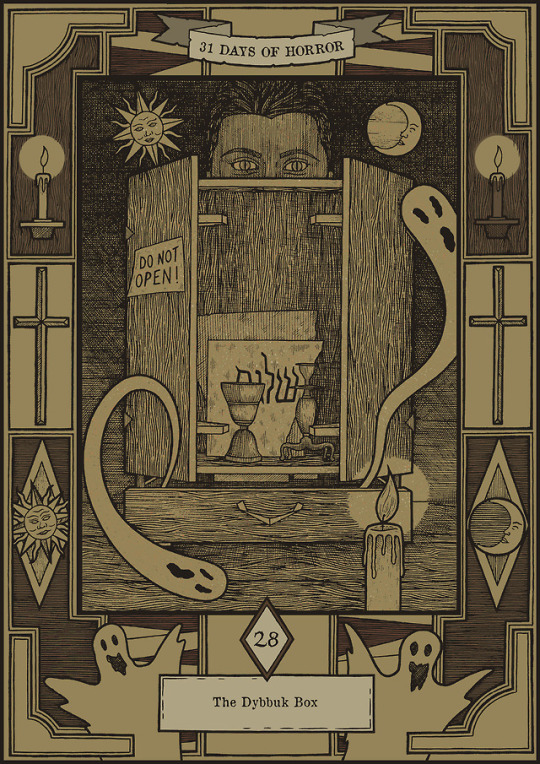
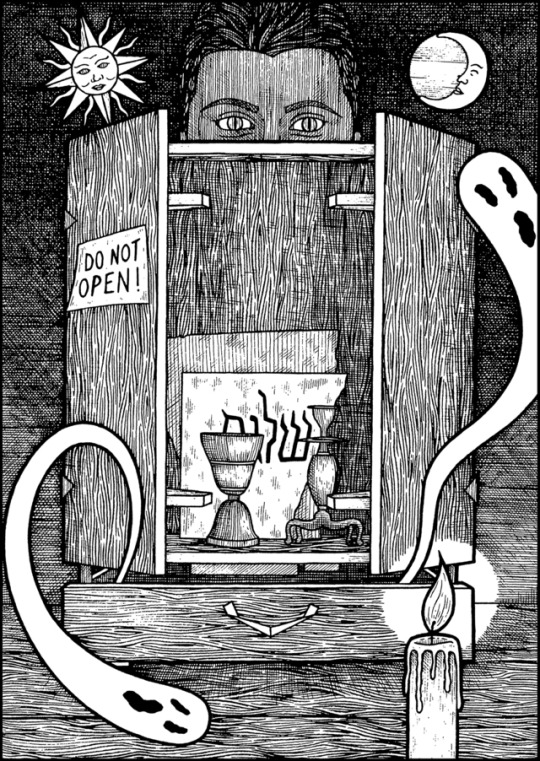
31 DAYS OF HORROR: CHAPTER 28
The Dybbuk Box
In Jewish folklore, there exists an unusual and malevolent entity known as a Dybbuk that has the ability to possess the body of a living host. The naming of this wicked spirit can trace its etymology to the Hebrew word 'dāḇaq', meaning 'to adhere' or 'to cling', as such those possessed by a dybbuk may find it difficult to rid themselves of their supernatural parasites. The dybbuk themselves are believed to be the wandering souls of the departed who are bound to this world with the sole purpose of completing an objective or fulfilling something that they may have been unable to accomplish during their mortal life. Taking this knowledge into consideration one would not wish to find themselves encountering a dybbuk should the misfortune ever arise.
Let me take you back to the days of World War 2 when a young woman by the name of Havaleh fled her native Poland to escape the atrocities enacted out on her country by the invading forces. Upon fleeing westwards towards the Iberian peninsula our young protagonist resided briefly in Spain before immigrating to the United States where she lived out the remainder of her life. Whilst in Spain, Havaleh purchased a Jewish wine cabinet which would later accompany her on her journey across the Atlantic. The cabinet would remain in her possession until her death where it would find a new owner having been sold by her Granddaughter at an estate sale. The buyer of this war-time curiosity enticed the attention of a man by the name of Kevin Mannis. Havaleh's Granddaughter informed Mannis that the box had been purchased in Spain after the Holocaust and had been in her Grandmother's possession for the majority of her adult life. Upon hearing that the box had previously been a family heirloom, Mannis attempted to return it to its original owners with little success. The Granddaughter insisted that she no longer desired the company of the box, believing that inside resided a malevolent spirit known as a Dybbuk. Havaleh had never once opened the box through fear of unleashing the evil that lay dormant deep inside and as such, it remained closed as the decades passed. Intrigued by the box's history, Mannis opened the box to discover what truly resided inside. Within the box resided numerous small items: a golden wine goblet, a lock of dark hair, two pennies dating back to the 1920s, a dried rosebud, a small statue with the Hebrew word 'Shalom' engraved onto its surface, and a single candle-holder. Despite this, however, Mannis found no reason to question the supernatural residency of a malevolent spirit as suggested by Havaleh's Granddaughter. Days later Mannis would find himself plagued by numerous paranormal occurrences which he eventually owed to the opening of the box. Mannis would later sell the box on eBay with the hopes of escaping the curse that he had unleashed on himself. Subsequent owners of the box would all report similar stories of hauntings and unrest that would force them into selling the box to a new intrigued owner. It has been reported that many Dybbuk boxes are currently in circulation across numerous shopping sites, although the credibility surrounding their authenticity will forever remain unknown. The only true method to discover their authenticity would be to open the sealed box and set free its Dybbuk prisoner, at which point your sate may already be sealed.
13 notes
·
View notes
Text
The word Allow means “to commend, praise; approve of, be pleased with; appreciate the value of; take into account or give credit for,"from French aloer, alloiier "to place, situate, arrange; allot, apportion, bestow, assign," from Latin allocare "allocate" Etymology dictionary says to see allocate.
allocate means “to set aside for a special purpose," from Latin allocare "allocate, allot," from Latin ad "to" + locare "to place” Allocate is a twin of allow.
The word allow makes me think of All-low or El low. El is One of the names for the demiurge, the malevolent Creator God imprisoning eternal sparks of divinity in this realm. Allocate. We’ve been Al-located. El located us in this prison. We’re all-located here. Aka allocated here until we figure out how to get or until higher creation finally destroys the demiurge. The controllers don’t hide the fact that this world is supposed to be a free will realm; yet the system in place proceeds to try to control everything we do - down to if you don’t sacrifice the goat the right way you will be killed.
Living in a system that only allows us to do certain actions and forbids others is a great way to get us all on a low frequency. Control is the opposite of what’s supposed to be in a free will realm. To restrict one’s actions stifle an individuals creativity and potent. Rules are the construct of man, not god. The only rule creation holds you to is do no intentional harm. The word commandment is process of common man. State of common man. The commandments are not from the supreme creator of all that is. Holding yourself back because you think you aren’t allowed to do something because the manmade system says you can’t or shouldn’t will ultimately lower your frequency.
Following the external versus the calling of your soul will lower your frequency. The higher one’s frequency is, the more dna the individual has activated; meaning more access to information. The brain operates as a transceiver and picks up information kind of like a radio station. You can get information On your frequency level and lower but not higher.
A high frequency is your best defense against low vibrational attack. Hence why those seeking control want mankind to fall to the lowest frequency possible, for some reason it is easier for the energy vampires or evils ones to harvest negatively polarized energy plus keeping humanity spellbound in a low frequency keep humanity from collectively remembering lost spiritual knowledge and from overthrowing those implementing the ridiculous, often tyrannical rules. Energy is energy and anytime I say “negative energy”, I mean negatively polarized energy, not negative as in bad. Energy can be negatively or positively polarized from zero point, equilibrium, or perfect balance. The denser or lower the energy the more desirable for the evil ones. I suspect matter itself is a prison.
Part of a soul’s lesson to learn in this life is to trust in yourself and stand in your own sovereignty versus following the crowd and external programming. Your inner voice is the god inside of you, don’t continuously dismiss the intuition. Your intuition/connection to the all is the one thing that won’t lie to you.
We are allowed to do anything you want in this world. Don’t worry about the rules of man and follow your gut instincts. Don’t limit yourself and have faith in yourself.I have faith in you. You should to. Have a great day
To enhance your intuition, start paying attention to the very first thought you get on a topic. Even if it seems crazy. As you start seeing these things come true, your brain will remember and begin to listen to the intuition more. It will get louder. The human body has been proven to have brain cells in the heart and gut and mind and it’s the heart and gut that dictate to the brain. Anytime there’s information that I really want to know, I will literally ask the universe to show me. I meditate on topics plus keep my eyes open for yeah answer. I typically do you get shown what I’m looking for relatively quickly. And it’s also important not to become hard set in any belief system. I may learn something today that causes me to throw out everything on a whole topic. And I have to reevaluate.
0 notes
Text
literally wanna give my readers homework like, in your opinion, what does the author mean with these lines, how do you interpret it, and why DKJKLGJDKLSG no bc i have. always thought i didn’t “get” poetry BECAUSE I DONT IDK? symbolism? metaphors or. the other thing. i looked up examples but idek what it is bc i dont think i read a single interesting poem in school.
ok. yes. ithace. love that one. i read one (1) interesting poem in school.
but anyway i am the kind of person tumblr loves to complain about like ‘ummm didnt u learn anything in school sweetie like about literature and analysing stuff and whatever :)’ no i did not i was too busy making up cool and fun scenarios in my head and avoiding answering questions unless i was the only one who knew the answer. for my ego stroke.
idk honestly the kind of shit they made us read in school like. is it good to read those books/stories/poems? yes. but why was it SO FUCKING BORING for example. i loved the one with the boy and his friends in nazi occupied greece like fuck that book. broke me. over and over again. and its the kind that would definitely interest a teenager. the story of a boy who grows over the 4-year period and idk the reality of every day life during that time? i was into it idk about the other morons
BUT WHY AM I READING ABOUT WHOEVER IS ESCAPING SMYRNI DRINKING PISS OR WHATEVER LIKE. GROSS. THIS WHOLE THING IS GROSS.
ariadne comes to mind that was like. the woman’s rage. shoot that shit into my veins. cant remember if it was poetry or prose but w/e.
they made the illiad boring. like i barely remember it but i was just like. i dont get it. what is this. probably the only thing that really stayed with me was hubris because im like oh okay. thats the thing modern greeks call swearing. thats cool. word etymology, ykno, absolutely normal interests for a 13 yr old. (and ok in reality, having attempted to read the illiad (translated) recently. it is. so slow. like something that i said about homer being the og ADHD bitch like SIR. SIR U ARE RAMBLING. CAN U FOCUS. WHAT HAPPENED TO ACHILLES ITS BEEN? 57 PAGES?
school made THE ODYSSEY BORING. like took us to a play of the odyssey and everyone’s complaining and im like !!!!! this is amazing!!! and we’re talking plays for teenagers, this is not the type of things you would see in the better-known theatres around the world alright. but i loved it its a really good story. really the mythology, and i love that guy odysseus he’s so smart its actually sexy.
(which reminds me i loved the les miserables play too i think the only adaptation i have even seen. not read the book either and at this point will not.)
school, the typical day at school, is honestly. fucking boring as shit. read words write words alright man can we do something that engages my tiny little brain. i am a curious creature ready to learn but y’all are only here to make us sit straight, stay quiet, line up, head down, do your homework and pass these standardised tests. you gotta go to the fucking bathroom on a their made up little timetable like are we in prison or are we free to be children and adolescents <3
anyway, my point is, i thought i wouldn’t ‘get’ poetry and like, wasn’t the kind of person who could write poetry but idk i can’t stop writing it now. like freestyling, yes, homer-like rambling and tangents, but it’s also cathartic and i think? im doing okay? for someone who’s fucking clueless? im gonna start reading poetry i have a tiny book by one of sappho’s followers, good place to start.
and maybe i’ll stop worrying about whether im doing it right bc fuck it man. its my poetry i make up the rules. and i really truly do want to know if the little hidden easter eggs or vague descriptions, attempts at similes, ~ symbolism ~ are at all.. good? easily understood? no fr im gonna give my readers homework.
1 note
·
View note
Text
Devilman Crybaby and the Occult: A Brief Examination
Akira as Lucifer
Akira in Japanese typically means “bright” or “clear,” primarily in the context of intellect. But if these concepts are applied to the matter of literal brightness, as in lightness, then Akira can be thought of as a representation of Lucifer. Specifically, in the sense that he is the “light bringer.” Lucifer typically is thought of as meaning “devil” but in actuality, the word translates in Latin Vulgate as “morning star,” or “the planet Venus” (the brightest planet) or of course, “light bringing.”
In many Gnostic, Luciferian and other esoteric schools of thought and occult ideology, Lucifer is not a figure of evil but instead he represents the principle of inner enlightenment, a guiding cosmic force of lightness. Another interesting fact is that phosphorus happens to mean “light bringer” in Greek,” and is a substance naturally occurring within all of our DNA – Luciferians argue that the power for spiritual growth and enlightenment comes not so much from external sources such as "God" in the orthodox way, but primarily from within us, recognizing our own abilities and powers.
This information does not come close to the rich history of Lucifer’s true identity but it offers us some fascinating insight into the realm of Devilman Crybaby. As mentioned, Akira can be thought of as “bright” (the connotation with the planet Venus implies he is found of things of beauty, peace, love) and as a light bringer in the sense that he is trying to bring forth change and illumination for a world in desperate need of a savior figure. Luciferianism emphasizes rebellion at cruelty and the intolerance of injustice as well, something which Akira understands and embodies perfectly.
His constant crying, his empathy, his emotionalism, this all grants him a sense of connectivity to humanity, even though once the truth of his identity is revealed the majority of the world still despises him. This is similar to the literal story of Lucifer, in that his identity has been proven to be based largely on fallacies and misconceptions, mistranslated scripture, and superstition, and yet nevertheless Lucifer seems doomed to forever bear humankind’s fear and loathing, much like Akira. There are a number of ways that Lucifer and Christ can be compared in these regards as well and by the time the series ends, Akira himself is forced into a state of what could be qualified as martyrdom.
Additionally, one of the most perplexing things to think about is that Ryo – who is truly Satan – finds Akira to be such a powerful and important figure in his life. In a sense, Akira is the light and brightness of his life: His role in Ryo’s life grants him purpose, it enlightens him into his true form, and so forth. Akira is Ryo’s Lucifer, essentially. This may sound confusing at first but bear in mind these points: 1). Lucifer and Satan are not necessarily the same person, 2). Much like many are familiar with the concepts of beings having the capacity for both good and evil or “God and Satan,” beings have the potential for Lucifer to enter their essence as well. And furthermore, another matter of interest is that some sources have speculated Lucifer and Satan to actually be two sides of the same being: Lucifer represents the spiritual, and Satan represents the earthly – this is similar to say, the holy trinity wherein multiple beings are actually one in the same. This would mean that Akira and Ryo are essentially the same entity.
To really make sense of these theories, one must dive deep into biblical lore, etymology, anthropological history, and occultism, and must be willing to keep an open mind. In actuality, the story of Lucifer is fundamentally simple but has been made incredibly convoluted over the years thanks to fear mongering, religious bigotry, and a myriad of other errors in human judgment. If you would like to know more on the nature of Lucifer, or further elaboration on the connection I perceive between Akira and Ryo, feel free to comment! In the meantime, I suggest “Lucifer: Princeps” by Peter Grey.
The Demons
The demons throughout the entire series are primarily based off of real spirits associated with demonology. Some date back all the way to the early ages of the clash between Abrahamic religions and ancient Paganism, some pertain to middle ages, etc. In particular, we have The Keys of Solomon to examine. The Key of Solomon itself is known as Clavicula Salomonis in Hebrew, and it is one of the most important examples of Renaissance era magick – from here, the more infamous Lesser Key of Solomon, or the Clavicula Salomonis Regis, was believed to have been written in the 17th century.
Both books deal with magical operations influenced from Jewish Kabbalah, pertaining to workings with various different spirits, but The Lesser Key in particular is known for one of its five different segments: The Ars Goetia. The Goetia bases itself on pre-existing sources of information on demons such as the PseudodomonarchaDaemonum (1577) and it offers rankings, information, and general descriptions of the 72 major demons. Each demon has their own ability, and they are divided into categories such as King, Duke, Prince, Marquis, President, Count, etc.
Demons are not limited to these sources, and many demons or demon-like spirits exist separate from the Goetia (e.g. the Djinns of Arabic spirituality). Further, the issue of whether or not demons are inherently evil is widely debated and much of it goes back to the matter of linguistics. In another article I wrote about demonology (linked below) you’ll see what I mean more clearly, but the key thing to remember is that a “daemon” simply means a wise, intelligent spirit. The evil spirits we are familiar with as demons were either developed as early Christianity’s opposition to “Pagan” idols (e.g. Baal became an honorific title of Lord into one of the most well known demons, Beelzebub became “lord of all that flies” into “lord of the flies”).
In Devilman Crybaby, there are a whole lot of demons. I will not be addressing all of them, but chief among them is Amon, the demon which merges with Akira. Amon is considered in magical lore to be a Marquis of Hell, governing 40 legions of spirits and as described in the Pseudomonarchia Daemonum:" [He] is a great and mighty marques, and commeth abroad in the likeness of a Wolf, having a serpents tail, [vomiting] flames of fire; when he putteth on the shape of a man, he sheweth out dogs teeth, and a great head like to a mighty [nighthawk]; he is the strongest prince of all other, and understandeth of all things past and to come, he procureth favor, and reconcileth both friends and foes, and ruleth forthy legions of devil.”
And by S.L. MacGregor Mathers in the his translation of the Goetia: "The Seventh Spirit is Amon He is a Marquis great in power, and most stern. He appeareth like a Wolf with a Serpent's tail, vomiting out of his mouth flames of fire; but at the command of the Magician he putteth on the shape of a Man with Dog's teeth beset in a head like a Raven; or else like a Man with a Raven's head (simply). He telleth all things Past and to Come. He procureth feuds and reconcileth controversies between friends. He governeth 40 Legions of Spirits.” Amon also shares a connection with the Egyptian god, Amun.
Less obvious references are made, sometimes in the form changed spellings. For instance, Kaim instantly reminded me of the demon Caim, a blackbird said to have knowledge of rhetoric, wisdom, and the ability to understand certain animals. Some other demonic figures that appear throughout the series – not so much the new adaptation – include Pazuzu, Lilith and Beelzebub, which shows that the series is not limiting its demonic lore to merely one source (i.e. Pazuzu pertains to Mesopotamian religion whereas Lilith for instance pertains to Hebrew sources of wisdom).
Where is God? And What About the Cycle of Life/Samsara?
This is a tricky one to pinpoint, because the more you attempt to wrap your head around all the different theories, the more you will be left wondering how certain things could have happened, what the nature of God truly is, and so forth. There is a lot of biblical inaccuracy to the show, but in comparison to Gnosticism and other ancient ideologies, God’s role actually makes more sense from these perspectives. For example, some Gnostic sects believe it was the Demiurge who created this world as a sort of “prison,” rather than God representing an all loving and benevolent force. But in the context of Devilman Crybaby, I would say the best explanation we have regarding his absence is the concept of Deus Absconditus which means “[A] god who in his remoteness seems to ignore human suffering,” or similarly, Deus Otiosus which means that God is idle and no longer involved in humanity’s concerns. Theories like these have broad implications with esoteric Christianity and other religions, and so it is hard to gauge how true they may be for Devilman Crybaby. One thing is for sure, the classical concept of Deus Ex Machina never occurs in the show, which does give more credibility to the idea that God may simply not care, be idle, or at the least, His plan is one that we the audience are not made aware of.
Another possible theory is that Satan himself is God. Utilizing a solipsistic framework, similar to what we see Shinji Ikari go through at the End of Evangelion, we see Satan completely and utterly alone in the world. He seems to have complete control over just about everything except for Akira’s death and his feelings. But if he himself were in fact God, could he not choose to end things right then and there. Evidence for this comes in the fact that, ironically, the creators held very true to biblical descriptions of Satan as being the most beautiful, initial, favorite, and most beloved being of God. The fact that he was so much immense power. And the fact that Ryo essentially must awaken to his higher self as Satan is symbolic of the one becoming a God and/or one realizing they are living in a solipsistic world. Solipsism is essentially the idea that you cannot prove anything or anyone outside of you truly exists, that you yourself may be represent the universe and all else is merely an illusion, speculation, or incapable of ever being seen as absolutely certain. If Satan were to have all of these traits, in some aspect, could this not make him a God of sorts? Upon realizing it, he chooses to kill himself and the world and begin the cycle all over again – notice the wheels within wheels that constantly appear during the explosions, these are in my opinion, references to the angelic visions of God’s chariot that the prophet Ezekiel saw.
So basically, Satan is willing himself into another incarnation (I believe that reincarnation applies more to this show due to the fact that Ryo awoke to a past life, as opposed to the idea that by destroying the cycle of life, death, rebirth – samsara – then everything would simply end for all eternity). It seems as though Ryo/Satan enjoys mind games, puzzles, challenges, etc. and so what better challenge than to repeat the process of rediscovering one’s true existence? Or, perhaps Akira represents God and in his final moments on screen, we are witnessing Satan’s ultimate punishment. The idea of Hell is an incredibly complex one, but the main point in Christian scripture is that it is a place in which there is only the absence of God – if Akira represented God and now is lost forever, this serves as Satan’s eternal suffering; God has abandoned him.
Miki the Witch/Color Theory
Miki is frequently referred to as a witch on numerous occasions, and at first we take it primarily as a bad joke based out of ignorance and fear. She certainly possesses some interesting traits such as her speed and agility, but is she really a witch? The answer to that, in my opinion, depends on how you look at things. During the witch trials that took place throughout Europe and of course Salem, women were accused of witchcraft for the slightest of “misbehavior.” Women who were particularly good at something on their own were very much victims of this curse; it was believed often times, a woman simply could not perform abilities of any kind to such excellence without the aid of magic, devils and demons, and so forth.
But in Miki’s case, I think one of the more subtle elements of this matter has to do with her clothing choices. In many scenes, she is wearing green. Green is actually quite an important color in witchcraft, Paganism, alchemy, you name it. It is the color of the heart chakra – Miki representing much of Akira’s love and devotion, his heart. It is associated with the zodiac sign of The Mother Goddess, a figure of Wicca and other Neo-Pagan beliefs who brings forth peace, fertility, prosperity, abundance, luck and deals with matters pertaining to envy, changing attitudes, the environment, and so forth. More “ominously” if such is to be believed, green does carry a more “Satanic” principle of to itself – as explained even in classic anime such as Belladonna of Sadness, it is a symbol for power (green = the color of nature, nature being Satan’s forest in some mythological/religious lore). Other theories – whether as overt as Satanism and witchcraft or more benign such as Hindu, Buddhist, and Taoist conceptions of colors can be applied to Miki
Color theory is important to bear in mind when examining all of the characters and scenes as well. For instance, the variety of colors that appears during the Sabbath could perhaps be reflective of a third eye awakening/demonic transformation/etc. As each color represents the seven chakras. The white and black dichotomy between Akira and Ryo is also one that clearly conjures forth images of duality such as the famous yin and yang symbol.
Conclusion
This is merely a short list meant to open the discussion on the new adaptations of Devilman Crybaby and how different realms of spirituality, the occult, the supernatural, religion, faith, and so much more play a larger role in shaping the development of things than you may realize. There are other examples to work with: Akira attempting to pass Ryo the torch and him neglecting it could be a sign of rejecting Lucifer/Christ/some sort of savior figure, it could even be thought of as something more symbolic of phallic imagery with regards to a sort of “creation” origin or the relationship between Ryo and Akira themselves. Everyone seems to be running, runners usually go at the start of gun’s loud bang; the big bang perhaps? Some things may seem like reaching, but just keep calm and think, do research, and come up with your own conclusions, there is more than meets the eye to Devilman Crybaby. Occultism pertains to that which is hidden, so it is up to the viewer to figure these sorts of things out. Also worth mentioning, the subject of will Aleister Crowley is known for the development of Thelema, which states that the purpose of life essentially to discover and fulfill one’s true will. How might this relate to the characters for instance? Again, there are a lot of starting points to go off of here, these are just springboards and suggestions.
Post this however you would like, if you’d like to make any YouTube videos inspired by these subjects just please credit me, Kvlt ov Romance in the description.
My post on demonology.
#devilman crybaby#ryo#akira#light#bright#venus#celestial#anime#manga#miki#rap#hip hop#music#art#japan#netflix#satan#lucifer#god#demon#angel#spirit#theory#fan theory#writing#crowley#thelema#witch#wicca#kvlt ov romance
159 notes
·
View notes
Text
A challenge was issued
but He refused to listen to it. He quoted the written Scriptures instead to counter it. and to gain victory over the lying dragon who also used lines from Psalm 91 to challenge the Lord to bow to his wishes.
Today’s reading from the Scriptures begins with the 4th chapter in the book of Matthew:
The Spirit then led Jesus into the desert to be tempted by the devil. Jesus fasted for 40 days and 40 nights. After this fast, He was, as you can imagine, hungry. But He was also curiously stronger, when the tempter came to Jesus.
Devil: If You are the Son of God, tell these stones to become bread.
Jesus (quoting Deuteronomy): It is written, “Man does not live by bread alone. Rather, he lives on every word that comes from the mouth of the Eternal One.”
Then the devil took Jesus to the holy city, Jerusalem, and he had Jesus stand at the very highest point in the holy temple.
Devil: If You are the Son of God, jump! And then we will see if You fulfill the Scripture that says,
He will command His heavenly messengers concerning You,
and the messengers will buoy You in their hands
So that You will not crash, or fall, or even graze Your foot on a stone.
Jesus: That is not the only thing Scripture says. It also says, “Do not put the Eternal One, your God, to the test.”
And still the devil subjected Jesus to a third test. He took Jesus to the top of a very high mountain, and he showed Jesus all the kingdoms of the world in all their splendor and glory, their power and pomp.
Devil: If You bow down and worship me, I will give You all these kingdoms.
Jesus: Get away from Me, Satan. I will not serve you. I will instead follow Scripture, which tells us to “worship the Eternal One, your God, and serve only Him.”
Then the devil left Jesus. And heavenly messengers came and ministered to Him.
It was not long until powerful people put John in prison. When Jesus learned this, He went back to Galilee. He moved from Nazareth to Capernaum, a town by the sea in the regions of Zebulun and Naphtali. He did this to fulfill one of the prophecies of Isaiah:
In the land of Zebulun and the land of Naphtali,
the road to the sea along the Jordan in Galilee, the land of the outsiders—
In these places, the people who had been living in darkness
saw a great light.
The light of life will overtake those who dwelt in the shadowy darkness of death.
From that time on, preaching was part of Jesus’ work.
Jesus: Repent, for the kingdom of heaven is at hand.
One day Jesus was walking along the Sea of Galilee when He saw Simon (also called Peter) and Andrew throwing their nets into the water. They were, of course, fishermen.
Jesus: Come, follow Me, and I will make you fishers of men.
Immediately Peter and Andrew left their fishnets and followed Jesus.
Going on from there, Jesus saw two more brothers, James the son of Zebedee and his brother John. They, too, were fishermen. They were in a boat with their father Zebedee getting their nets ready to fish. Jesus summoned them, just as He had called to Peter and Andrew, and immediately they left their boat and their father to follow Jesus.
And so Jesus went throughout Galilee. He taught in the synagogues. He preached the good news of the Kingdom, and He healed people, ridding their bodies of sickness and disease. Word spread all over Syria, as more and more sick people came to Him. The innumerable ill who came before Him had all sorts of diseases, they were in crippling pain; they were possessed by demons; they had seizures; they were paralyzed. But Jesus healed them all. Large crowds from Galilee, from Jerusalem, from the ten cities called the Decapolis, from Judea, and from the region across the Jordan followed him.
The Book of Matthew, Chapter 4 (The Voice)
Today’s paired chapter of the Testaments is the first chapter of the book (ancient scroll) of Ezra that begins with a written proclamation:
Cyrus King of Persia: “Build The Temple of God!”
In the first year of Cyrus king of Persia—this fulfilled the Message of God preached by Jeremiah—God prodded Cyrus king of Persia to make an official announcement throughout his kingdom. He wrote it out as follows:
From Cyrus king of Persia, a Proclamation: God, the God of the heavens, has given me all the kingdoms of the earth. He has also assigned me to build him a Temple of worship in Jerusalem, Judah. Who among you belongs to his people? God be with you! Go to Jerusalem which is in Judah and build The Temple of God, the God of Israel, Jerusalem’s God. Those who stay behind, wherever they happen to live, will support them with silver, gold, tools, and pack animals, along with Freewill-Offerings for The Temple of God in Jerusalem.
The heads of the families of Judah and Benjamin, along with the priests and Levites—everyone, in fact, God prodded—set out to build The Temple of God in Jerusalem. Their neighbors rallied behind them enthusiastically with silver, gold, tools, pack animals, expensive gifts, and, over and above these, Freewill-Offerings.
Also, King Cyrus turned over to them all the vessels and utensils from The Temple of God that Nebuchadnezzar had hauled from Jerusalem and put in the temple of his gods. Cyrus king of Persia put Mithredath the treasurer in charge of the transfer; he provided a full inventory for Sheshbazzar the prince of Judah, including the following:
30 gold dishes
1,000 silver dishes
29 silver pans
30 gold bowls
410 duplicate silver bowls
1,000 miscellaneous items.
All told, there were 5,400 gold and silver articles that Sheshbazzar took with him when he brought the exiles back from Babylon to Jerusalem.
The Book of Ezra, Chapter 1 (The Message)
my personal reading of the Scriptures for Saturday, march 6 of 2021 with a paired chapter from each Testament of the Bible, along with Today’s Psalms and Proverbs
A post by John Parsons that looks at the ancient Hebraic holidays and how they correspond to the spiritual truth of the Son:
The Torah divides the calendar into two symmetrical halves: the Spring and the Fall, indicating the two advents of Messiah. The Biblical year officially begins during the month of the Passover from Egypt (i.e., on Nisan 1, called "Rosh Chodashim," see Exod. 12:2), and the spring holidays of Passover, Unleavened Bread, and Firstfruits both recall our deliverance from Egypt and also our greater deliverance given by means of the death, burial, and resurrection of the Messiah, the great Passover Lamb of God: Yeshua was crucified on erev Pesach (during the time of the sacrifice of the Passover lambs), buried during Chag Hamotzi (the festival of Unleavened Bread), and was resurrected from the dead on Yom Habikkurim (the Day of Firstfruits). Fifty days after the Passover, on the climactic holiday of Shavuot (i.e., the feast of Pentecost), the wave offering was made at the Temple as the Ruach HaKodesh (Holy Spirit) fell on the believers in fulfillment of the promise given by our Lord.
Note that the giving of the Holy Spirit occurred precisely according to the calendar countdown given in the Torah (Lev. 23:15-16), and that it occurred after the resurrection of Yeshua -- just as our Messiah foretold (John 16:7; Acts 1:6-8, 2:1-4). This proves that the feasts of the LORD (מוֹעדי יהוה) were not abolished after the institution of the New Covenant and the crucifixion of our Lord. The meaning of the gospel is prefigured in the holidays given in Torah. See Luke 24:27, 24:44; John 5:46; Acts 26:22, etc.
Kindly note that in accordance with both Torah and Jewish tradition, the holiday dates (shown in the table below) begin at sundown (Gen. 1:5). [Hebrew for Christians]
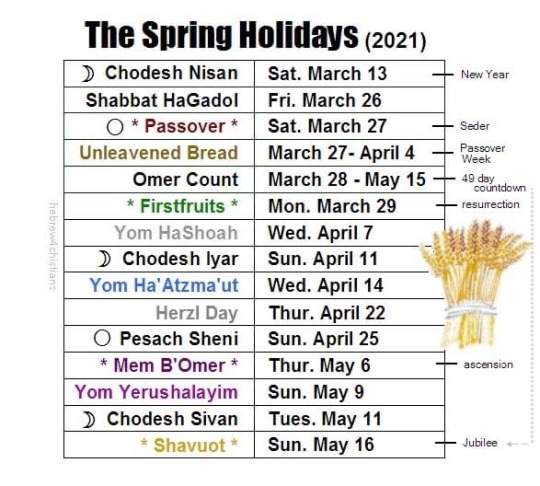
3.3.21 • Facebook
and another post to accompany this:
Christian (and Jewish) theology insists that truth matters, and knowing the truth about God is absolutely essential for life itself. Nothing is more important. Nothing is more vital. “This is eternal life (חַיֵּי עוֹלָם), that they may know you, the only true God (אֶל־אֱמֶת), and Yeshua the Messiah (יֵשׁוּעַ הַמָּשִׁיחַ) whom you have sent (John 17:3). The truth sets us free; it is the unbreakable seal that bears witness of reality. In the Gospel of John it is recorded that Yeshua said, “I am the way, the truth, and the life” (i.e., ᾽Εγώ εἰμι ἡ ὁδὸς καὶ ἡ ἀλήθεια καὶ ἡ ζωή). The Greek word translated “truth” in this verse is aletheia (ἀλήθεια), a compound word formed from an alpha prefix (α-) meaning “not,” and lethei (λήθη), meaning “forgetfulness.” (In Greek mythology, the “waters of Lethe” induced a state of oblivion or forgetfulness.) Truth is therefore a kind of “remembering” something forgotten, or a recollecting of what is essentially real. Etymologically, the word aletheia suggests that truth is also “unforgettable” (i.e., not lethei), that is, it has its own inherent and irresistible “witness” to reality. In that sense light is a metaphor for truth: “The light shines in the darkness, and the darkness has not overcome it” (John 1:5). There can be no truth apart from moral reality. People may lie to themselves, but ultimately truth has the final word.
Greek scholars note that the word lethei itself is derived from the verb lanthano (λανθάνω), which means “to be hidden,” so the general idea is that a-letheia (i.e., truth) is non-concealment, non-hiddenness, or (put positively) revelation or disclosure. Thus the word of Yeshua - His message, logos (λόγος), revelation, and presence - is both “unforgettable” and irrepressible. Yeshua is the Unforgettable One that has been manifest as the express Word of God (דְּבַר הָאֱלהִים). Yeshua is the Light of the world (אוֹר הָעוֹלָם) and the one who gives us the “light of life” (John 8:12). Though God’s message can be suppressed by evil and darkened thinking, the truth is self-evident and intuitively certain (see Rom. 1:18-21).
We have a moral imperative, given by God Himself, to receive the truth and to live according to the nature of spiritual reality. Those who reject or suppress the truth, however, are responsible for their actions, as it is written, “No one who practices deceit shall dwell in my house; no one who utters lies shall continue before my eyes” (Psalm 101:7). [Hebrew for Christians]

3.5.21 • Facebook
Today’s message from the Institute for Creation Research
March 6, 2021
Breaking Bread
“And as they were eating, Jesus took bread, and blessed it, and brake it, and gave it to the disciples, and said, Take, eat; this is my body.” (Matthew 26:26)
This is the first of 12 specific references to the “breaking of bread” in the New Testament, each reminding the participants of Christ’s sacrificial death. Although Paul had not been present at the Last Supper, he had evidently received a special revelation concerning it. “For I have received of the Lord that which also I delivered unto you, that the Lord Jesus the same night in which he was betrayed [literally, ‘while he was being betrayed’] took bread: And when he had given thanks, he brake it, and said, Take, eat: this is my body, which is broken for you: this do in remembrance of me” (1 Corinthians 11:23-24). Similarly, drinking of the cup recalled to them His shed blood. All of this helped them remember and appreciate the great reality of eternal life imparted to them through His death, for He had said, “Whoso eateth my flesh, and drinketh my blood, hath eternal life” (John 6:54).
For a while after His resurrection and their empowering by the Holy Spirit, “they, continuing daily with one accord in the temple, and breaking bread from house to house” (Acts 2:46), seem to have combined each day this remembrance of the Lord’s supper with their own evening meals. Sometime later, it seems to have been “upon the first day of the week, when the disciples came together to break bread” (Acts 20:7).
There is no specific instruction in Scripture as to how often this breaking of bread should be observed, but when it is observed, the implied actions of “discerning the Lord’s body,” giving thanks to Him for His sacrifice for us, and “[judging] ourselves” (1 Corinthians 11:29, 31) are far more vital than the physical act of eating the broken bread. HMM
0 notes
Text
April 20, 2020
No more muzzling my words

OK, so I’m just going to say it. There are times when this really stinks. And it actually feels good to give myself permission to admit that.
One of my favorite novelists, Anne Patchett, author of Bel Canto, also wrote a memoir called Truth & Beauty about her lifelong best friendship with someone who struggled with cancer since childhood. What I remember most is her friend’s very unusual way of enduring horrific hardships that included having her jaw surgically removed, (no less in the middle of self-conscious adolescence). To feel better about her own situation, she would regularly re-read The Diary of Anne Frank in a sort of schadenfreude effort to remember that there were people who’d had it far worse than herself. However, these contrived gestures only took her so far.
I guess the truth is, there is only so much glass-half-full thinking any of us can exercise. Realizing this, I was relieved to hear Brene Brown’s recent podcast about Comparitive Suffering,
https://brenebrown.com/podcast/brene-on-comparative-suffering-the-50-50-myth-and-settling-the-ball/
Here, she recognizes that while the daily news barrages us with crises much greater than our own (lost jobs, health, and even loved ones), many of us feel guilty for bemoaning our own losses at this time, because we think we should be grateful for what we have. Certainly, this universal suffering has allowed us to gain some clearer perspective on our lives and our blessings. And the fact that the entire world is experiencing some similar aspects of this reality has enabled us to build real global empathy. However, it is also true that each micro-loss deserves its own relative mouring period. So, I am going to give myself a little license to acknowledge what I am grieving at this time. But I wanted to find a creative way to do this. So, I am going to write a love letter to the time before COVID, identifying the things I truly miss. This idea came out of an exercise we led with my non-profit’s Women Rock group. They are co-writing songs to express the myriad of feelings they are having during this period. In one song, they plan to write about the solace that nature brings them right now. But they also want a vehicle to communicate their challenges. In other words, they want somewhere to “deposit the negative,” because this can actually be very healing: to name what’s wrong, genuinely feel the impact of it in your life, and then let it go. The etymological root of the word de-posit means to put (poner), away (-de). Ironically, this is similar to the origin of the word positive, which is to formally lay down (or to state absolutely). So, perhaps by absoluting stating what we feel bad about, we leave room to feel good about what’s left.
But in case this is just a little too sad for some people to read, try imagining the theme song to Jimmy Fallon’s regular Thank You Notes segment, for a bit of comic relief while you read. Here he is in his At-Home Edition, writing some with his daughters:
https://www.youtube.com/watch?v=f6x2UgPVYJs

Vancouver Mural Festival on Main St
Dear pre-COVID days,
I remember how good it felt to walk down Main St and hug everyone from my neighbor, to my colleague, to the barista. You were so open in the way you invited human touch on a daily basis.
I was so grateful that you allowed me the opportunity to interact with people from all different walks of life. You let me work in so many different environments, from elementary schools, to prisons, to seniors centres, where I was privileged to hear people’s stories as they found their own creative voices.
I loved being free to spend time with my family even though they live far away. You made it possible to see my parents in Arizona, and my brother in NY, and my uncle in Colorado, and my in-laws in Ontario, every year, despite the distance.
I enjoyed all of the opportunities you gave me to experience live art. You animated my world and made it technicolor, with concerts, dance clubs, galleries, theatre performances, and different arts festivals every week.
I loved how healthy I felt running around the tennis courts at Queen Elizabeth Park. You made it so easy to exercise my lungs, my legs, my arms, my focus, my flexibility and my stamina all at the same time.
I felt so much passion for the adventures that you brought me to. You generously satisfied my infinite curiosities with music projects in Zambia, and holidays in Hawaii, and cultural immersions in Guatemala.
I miss all of the the ways you let me love and live and work and play freely. And I long for the day you return,
Laura
April 21, 2020
Neighborhood Art
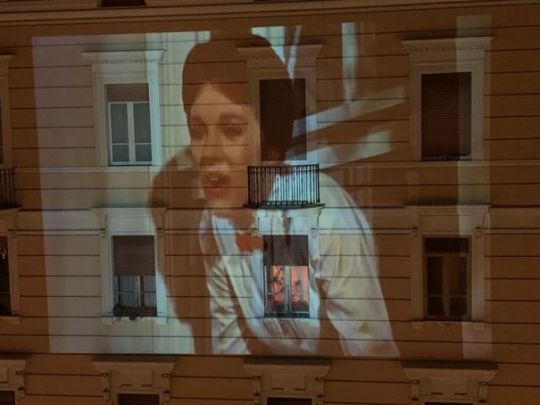
There are so many signs that we are all missing connection and stimulation during quarantine. But the human spirit is extremely buoyant. So, we’ve found remarkable ways to share artistic moments through the walls of COVID.
In Rome, locals are projecting classic films against their apartment building facades: https://www.wantedinrome.com/news/lockdown-rome-lights-up-with-cinema-by-night.html
In Berlin, neighbors are displaying art installations from their balconies:
https://www.smithsonianmag.com/smart-news/berlin-artists-turn-their-balconies-mini-galleries-180974677/

An art installation by Raul Walch, created for the “Life, art, pandemic and proximity” project
In Ohio, kids play cello duets for an elderly neighbor:
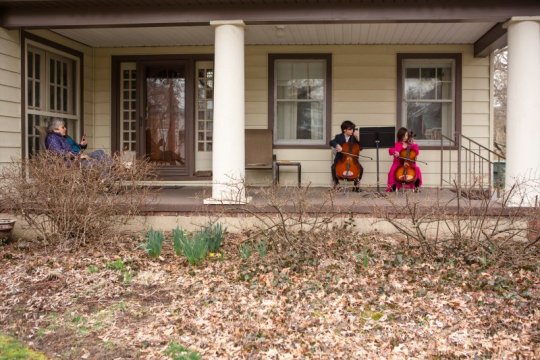
And right here in Vancouver, people lead streetside Zumba classes as seniors home residents dance along:
https://www.cbc.ca/player/play/1716406851557
April 22, 2020
Earth Day in Isolation

I am hardly the first to note that while this virus has taken so much from mankind, it has also given Mother Earth the long-awaited rest she so deserves. There have been plenty of photos of Himalayan mountain tops viewed from Indian cities for the first time in decades, or Orcas returning to Vancouver’s shores to prove this.
In another gift to our planet, appropriately on Earth Day here in BC, where it has oddly not rained for 30 days, it appears that Gaia is being showered with much needed rain for her day of celebration. And even a sun-worshipper like me has been doing rain dances lately, to ensure that our city will not be shrouded in smoke from a fire-ravaged province, as we have been for the past two summers.
On a different note, a more distorted personification of nature has been touted by many a cynical observer in recent weeks, citing Covid as retribution against humans from a vengeful Mother Earth. I do not subscribe to such punitive thinking. But I do believe there are environmental lessons to be learned from this crisis if we listen closely enough.
Writer Kristin Flyntz makes this point more beautifully than I ever could, in her Greatful Web post: https://www.gratefulweb.com/articles/imagined-letter-covid-19-humans Here, instead of a love letter to pre-Covid days, she has imagined the letter that Covid might write to humans. The tone is intentional and generous but also insistent. It is spoken as if from a friend not an enemy. And it proposes that we ask the hard questions: “As the health of a tree, a river, the sky tells you about the quality of your own health, what might the quality of your health tell you about the health of the rivers, the trees, the sky, and all of us who share this planet with you?”
Another letter, falsely attributed to Bill Gates, whose proven himself to be a true leader of responsiveness in this critical time, also had similar things to say. The anonymous writer claims that this time: “is reminding us that this Earth is sick. It is reminding us that we need to look at the rate of deforestation just as urgently as we look at the speed at which toilet rolls are disappearing off of shelves. We are sick because our home is sick.”

And as usual, artists are responding too. The NY-based NGO, Earth Celebrations has postponed their Virtual Earth Day Pageant for May 9th in the interest of garnering more public participation, with a callout for anyone who wants to craft a costume, mask, puppet, etc. All are welcome. And more details can be found here: https://earthcelebrations.com/?fbclid=IwAR30nj7NtS52E-RLjpvz739L-3fcp-DtnJ1YeVE8Roln4vJXPC7bzBLxew0
April 23
Virtual Festivals
If you’re looking for an alternative to Netflix and chillin’, there are endless arts festivals that have moved content online, for your streaming pleasure. So, I thought I’d recommend a few interesting ones here.
If it’s efficiency you’re after, when browsing thru infinite entertainment options, the Social Distancing Festival does all the work for you, by scouring the globe to curate the best livestreamed events they can find. Links include everything from modern dance to virtual gallery tours to musical theatre:
https://www.socialdistancingfestival.com
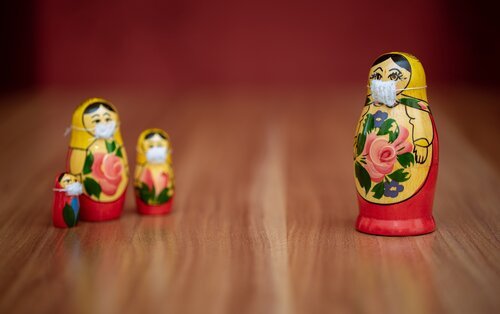
Myseum of Toronto’s Art in the Time of Covid - work by Evgeni Tcherkassk
For some lighter fare, this Edmonton Series hosts nightly cabaret, music, and comedy acts performed by local artists from their homes.
https://www.citadeltheatre.com/2019-2020/stuckinthehouse?utm_source=Citadel+Theatre&utm_campaign=67600c620f-Stuck-in-the-House&utm_medium=email&utm_term=0_482a5c3fca-67600c620f-80741247
And if you’re looking for a bit more sophistication, Toronto’s Festival of Literary Diversity has managed to move online, and it starts next Thursday. Their line-up features many of Canada’s finest emerging and established voices. My personal favorite, Mona Awad will be reading from her new novel, Bunny, which was the funniest read I’ve had in ages. In this high art version of Mean Girls, she nails the pretentious banter of grad school writing cliques with a dash of magical realism. https://thefoldcanada.org
April 23
Creative Gratitude

Florida police thank-you
Our shared appreciation for front line workers has become a true muse for collective community creativity.

Clockwise: Navajo muralist Ivan Lee; local Vancouver sidewalk; Long Island artist, Kara Hoblin
But this one takes the cake for audacity!
https://gfycat.com/magnificentabsolutegosling-health-workers-coronavirus-thank-you-meme

0 notes
Text
"M" ... THE YELLOW DRAGON
________________________________________________________________
Dragon Den - Black Tramway - Who might the dragon be?

More under the cut ...
The meaning of the cipher
SOO LIN: Here: the line across the man’s eyes – it’s the Chinese number one.

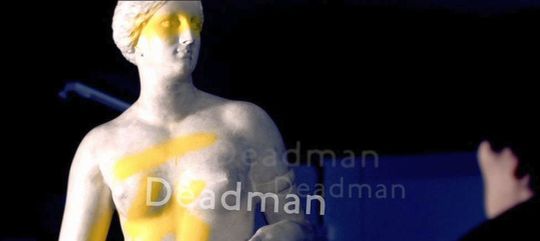

Anyone watching from outside the window would see the line right over Sherlock's face. 'Deadman' indeed!
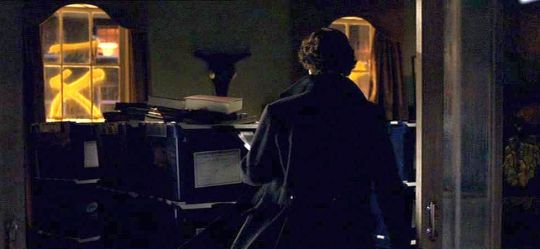
The meaning of the yellow color
SHERLOCK: Know the author? RAZ: Recognise the paint. It’s like Michigan; hardcore propellant. I’d say zinc.

Source: Nixxie-pic
MICHIGAN - WHAT LIES IN A NAME
The word "Michigan" originally referred to the lake itself, and is believed to come from the Ojibwa word mishigami meaning ..... "great water" (Deep waters everywhere, it seems!)
MICHI - german short version of 'Michael' also (Micha, Michal, Michel)
English versions are - Mick, Mickey, Micky, Mike, Mikey (What a coincidence!)
Etymology of the name Michael:
Michahel - from Biblical Hebrew - 'Who is like God?' (Really?)
Archangel Michael - God's first warrior - the one who leads his armies against satan. He is also often depicted holding the Scales of Justice and weighing the souls on Judgement Day. (Well, well ...)
(Source of pic)
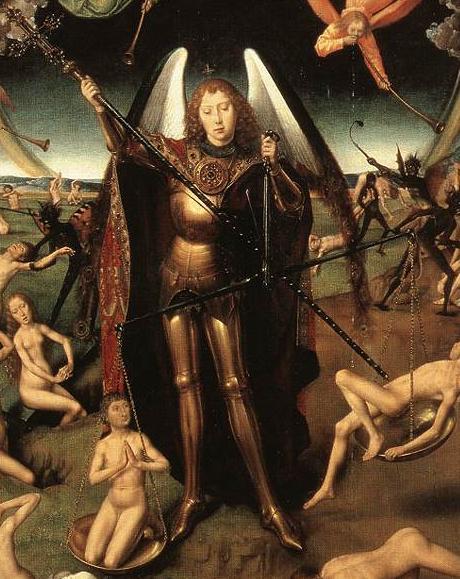
MRS. HOLMES: Mikey, is this your laptop?
MYCROFT: On which depends the security of the free world, yes ...
Black wings .... well, well .....
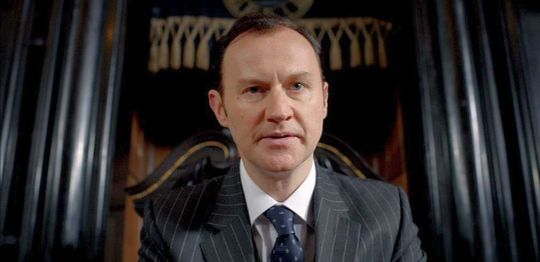
This looks very much like sinister clouds are gathering over big brother Mycroft's head. Well, maybe not. Everything depends entirely against which kind of foe Sherlock is fighting in this story. As far as I see there are three possibilities:
1 - Sherlock is confronted by a real life enemy. Someone who wants to destroy him for whatever reason. Mycroft, Moriarty, Mary, Moran, Magnusson .... there are several characters connected to 'M'. Even 'the woman' fits when the 'W' gets turned round.
2 - Sherlock is confronted by enemies lurking inside himself. His own fears and demons. Expressed by masks, chains, prisons and deep waters in all their vatiations. The unspecified underground terrorists, networks, agents, cults ... all of them representing 'emotions'. And a foe like this would also come with an 'M' .... it would be 'ME' .... Sherlock himself.
3 - Sherlock is confronted by a mix of the above mentioned possibilities. There are his own demons haunting him but there is also a real life enemy lurking in the shadows. Maybe even one who is responsible for the existance of those demons in the first place.
Interestingly the color of the dragon is YELLOW and little Sherlock chose YELLOWBEARD as his pirate name. The mask lying in the cardboard box is bright YELLOW as well. Maybe that's a good clue?
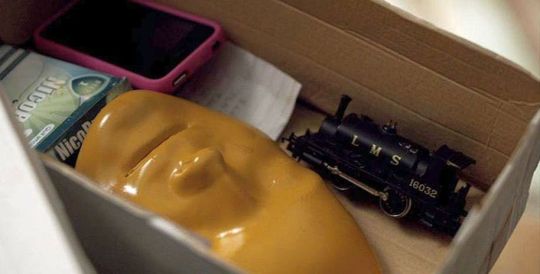
I leave you to your own deductions. Thanks @callie-ariane for the scripts.
August, 2017
@gosherlocked @loveismyrevolution @monikakrasnorada @sagestreet @sarahthecoat @tjlcisthenewsexy @kateis-cakeis @sherlockshadow @darlingtonsubstitution
77 notes
·
View notes
Note
you're a bundle of joy and contradictions. First of all how the hell are You're a libertarian socialist? that has as much nuance and consistency as being an anarcho communist. A Jew that eats pork and is pan-sexual, supposedly advocates for individual freedoms but have no problem enacting violence against dissenting opinions. It's always convenient for white regressive leftists to take away our freedoms and think they care about us when it suits them.
I was going to reply with the Castlevania "what is a man, a miserable little pile of secrets!" Gif, but, yknow, I'm just going to actually reply to this. Since asks on mobile still use the old layout and html is a pain, I'll just paste the sources in as I go. Also you think you're the first troll ask I've gotten? Hashem help you.- "Libertarian" started as a leftist term that anarchists used in 19th century Europe when the term "anarchist" was banned. It didn't become associated strongly in the US with the right-wing until classical liberals like Murray Rothbard stole it in the 60's. https://en.m.wikipedia.org/wiki/Libertarianism#etymology- Specifically on what "libertarian socialism" means. https://en.m.wikipedia.org/wiki/Libertarian_socialismhttps://theanarchistlibrary.org/library/ulli-diemer-what-is-libertarian-socialismhttps://m.youtube.com/watch?v=PIfKrI6Q_W8- Hate to break it to you, but most anarchists are left wing. Anarchism and Communism are cooperative ideologies, not opposed. https://en.m.wikipedia.org/wiki/Anarcho-communismhttps://theanarchistlibrary.org/library/wayne-price-what-is-anarchist-communismhttps://libcom.org/thought/anarchist-communism-an-introduction- I am a Reform Jew. Reform Judaism has been accepting of LGBTQ people since at least the 1960's https://reformjudaism.org/practice/ask-rabbi/what-does-reform-judaism-say-about-homosexualityhttps://www.hrc.org/resources/stances-of-faiths-on-lgbt-issues-reform-judaism- Ancient Israel also had as many as 8 gender roles.- Reform Jews typically don't follow kosher laws when it comes to pig and cheeseburgers and shellfish or any other kind of trief. Some Reform Synagogues even encourage it! Conservative and Orthodox Jews, not so much, but us Reform Jews eat what we choose. - Punching Nazis is a good thing. It's not a simple disagreement when they will throw people like me in a camp and then a gas chamber. I'm not going to take that laying down. It has nothing to do with personal liberties, I'm not going to throw someone in prison for "thought crime" especially since I don't think the government should get to decide which ideologies are deemed dangerous, but I sure as shit will fight back. You say Hitler was right or call me a Kike, those are fighting words and I won't let you get away Concequence free.So get out of my ask you fakatka little shit.
19 notes
·
View notes